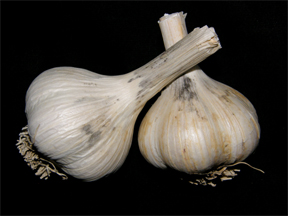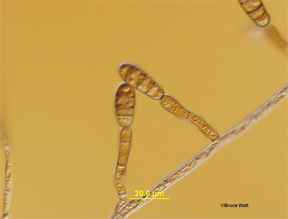Bulletin #1204, Embellisia Skin Blotch of Garlic
Bulletin #1204, Embellisia Skin Blotch of Garlic (PDF)
Steven B. Johnson, Crops Specialist, University of Maine
For information about UMaine Extension programs and resources, visit extension.umaine.edu.
Find more of our publications and books at extension.umaine.edu/publications/.
- Figure 1. Bulb symptoms of Embellisia Skin Blotch of Garlic (Photo by S. Johnson)
- Figure 2. Embellisia allii, casual agent of Embellisia Skin Blotch of Garlic (Photo by B. Watt)
History
Garlic (hardneck: Allium sativum var. ophioscorodon and softneck: Allium sativum var. sativum) is susceptible to a large number of fungal pathogens. Garlic is widely grown in Maine and recently has become a significant source of income for many diversified vegetable farms.
Causal Organism
Embellisia Skin Blotch of Garlic is caused by the fungal pathogen Embellisia allii (Helminthosporium allii). The pathogen is widely distributed in Maine as well as elsewhere in the world. Embellisia Skin Blotch of Garlic is typically a cosmetic issue for garlic vendors and is easily managed.
Disease Cycle
Embellisia allii overwinters in plant debris, infested soil, and diseased bulbs and cloves. Embellisia Skin Blotch of Garlic is more of a problem in wet years, or in years with poor drying conditions after harvest. The disease can also be a problem if garlic is stored or marketed under moist conditions.
Symptoms
Disease symptoms start as small water-soaked lesions on the bulbs and develop into brown to black lesions generally underneath the bulb epidermis. Generally, Embellisia allii causes cosmetic damage on the bulb only. Left unchecked, the disease may progress into cankers on the cloves.
Control
The wide distribution of the pathogen in Maine limits the value of crop rotation as a management tool for disease control. Proper drying conditions and storage conditions with relative humidity less than 70 percent will greatly reduce the potential for the disease. Sorting and removal of diseased bulbs is recommended. When the disease is present, removing the affected outer scales on garlic bulbs before sale or use is usually sufficient.
Information in this publication is provided purely for educational purposes. No responsibility is assumed for any problems associated with the use of products or services mentioned. No endorsement of products or companies is intended, nor is criticism of unnamed products or companies implied.
© 2011, Reviewed 2020
Call 800.287.0274 (in Maine), or 207.581.3188, for information on publications and program offerings from University of Maine Cooperative Extension, or visit extension.umaine.edu.
The University of Maine is an EEO/AA employer, and does not discriminate on the grounds of race, color, religion, sex, sexual orientation, transgender status, gender expression, national origin, citizenship status, age, disability, genetic information or veteran’s status in employment, education, and all other programs and activities. The following person has been designated to handle inquiries regarding non-discrimination policies: Director of Equal Opportunity, 101 North Stevens Hall, University of Maine, Orono, ME 04469-5754, 207.581.1226, TTY 711 (Maine Relay System).



